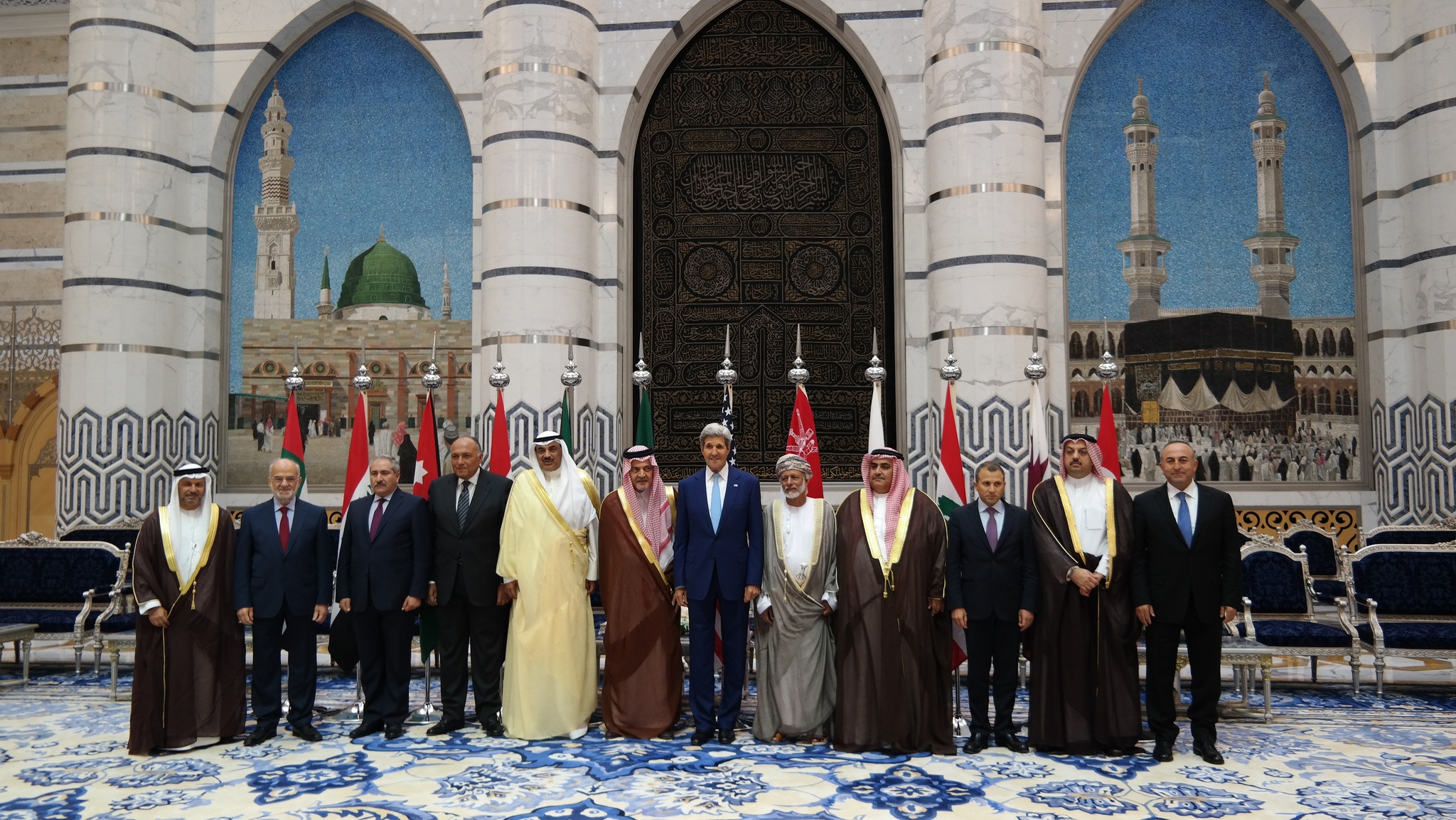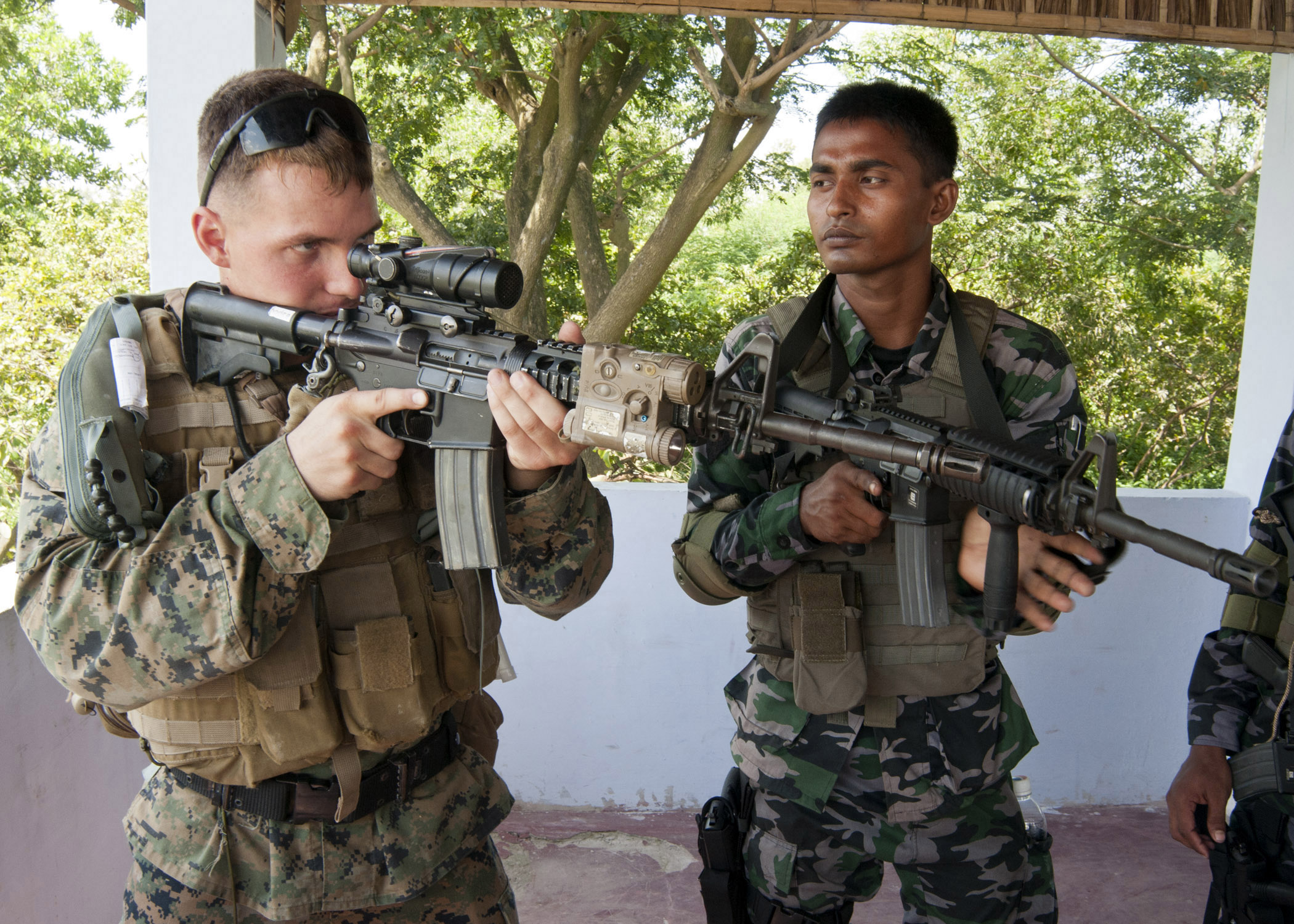Governance and Security Sector Assistance: The Missing Link—Part II
Editor's Note: Last week we looked at how the lack of attention to governance has hindered effective U.S. security sector assistance. This week Gordon Adams of American University and Richard Sokolsky of Carnegie take their arguments one step further. First they go into some depth on current U.S. programs and then they offer a new paradigm for assistance that incorporates governance more systematically and offers ideas for how to change U.S. assistance programs.

Published by The Lawfare Institute
in Cooperation With

Editor's Note: Last week we looked at how the lack of attention to governance has hindered effective U.S. security sector assistance. This week Gordon Adams of American University and Richard Sokolsky of Carnegie take their arguments one step further. First they go into some depth on current U.S. programs and then they offer a new paradigm for assistance that incorporates governance more systematically and offers ideas for how to change U.S. assistance programs.
***
Introduction
In the first part of this article, we suggested that the success of U.S. security assistance and cooperation programs would depend heavily on the extent to which they were embedded in a broader strategy to improve governance in recipient countries. Effective, efficient, accountable, uncorrupt governance, we think, is an essential prerequisite for security assistance that achieves U.S. policy goals and creates an accountable, effective security sector and military in recipient countries.
Security Sector Assistance
The most direct engagement the U.S. has with the governing institutions of aid-recipient countries is the military. Setting aside the rather small proportion of U.S. foreign assistance that directly and purposely targets “governing justly and democratically,” the 25% of U.S. foreign assistance that targets peace and security constitutes a direct engagement with what is frequently the strongest sector of governance—the military and surrounding security institutions. Moreover, the security assistance funds of the Department of State are only part of the story. Over the past decade, starting with large train-and-equip programs in Iraq and Afghanistan, the Department of Defense (DoD), which has always implemented the State-funded programs, has become as significant a funder of security assistance (and what the DoD calls “security cooperation,” or “Building Partner Capacity”) as the State Department itself.
The effectiveness of much of this total security assistance investment—which can be more than $25 billion a year—is in doubt, in part because it has not been explicitly linked to recipient country performance in the areas of governance. The State Department portfolio of programs (see Table 1), including the Foreign Military Financing Program (FMF), International Narcotics Control and Law Enforcement Programs (INCLE), International Military Education and Training (IMET), and Peacekeeping Operations (PKO), are largely focused on training and equipping foreign military forces.

Implemented by the U.S. military and security assistance contractors, these programs have helped in some cases to achieve narrow military objectives—for instance, improving the combat capabilities of allies and partners and the interoperability of U.S. and coalition partner forces. In addition, the assistance the United States has provided over the past decade to the armed forces of the Philippines and Columbia has helped to root out stubborn insurgencies and U.S. military assistance to former Warsaw Pact countries have improved their military capabilities and strengthened their capacity to operate with U.S. forces in the Balkans and Afghanistan.
The growing portfolio of programs funded through the Defense Department (see Table 2) has added to the size and dispersal of such programs, including the Section 1206 program and training and equipping the Afghanistan and Iraq militaries. Overall, the DoD portfolio of directly funded security cooperation programs has amounted, in some years, to over $10 billion in additional funding. Moreover, the expansion of the DoD portfolio continues, with the more recent announcement of a South East Asian Maritime Security Initiative, which could make as much as $425 million available for five countries in that region over the next five years.

DoD policy makers argue that this portfolio of new, DoD-funded efforts was needed, in part, because the traditional array of programs at State operated under bureaucratic restrictions and requirements that made them slow and unresponsive to short-term needs. In reality, however, much of the DoD activity is administered by precisely the same bureaucratic organization—the Defense Security Cooperation Agency (DSCA)—that implements FMF and IMET. The bureaucratic constraints and obstacles, in other words, are more likely to be encountered inside the DoD organization than at State.
Overall, U.S. train-and-equip programs have not achieved great success in encouraging foreign military partners to operate and govern their regular armed forces in accordance with the rule of law and democratic norms, despite some training and rhetoric that includes this goal. Moreover, it is far from clear that these programs achieve even the more limited objectives of developing recipient country capability or giving the U.S. enduring influence. The primary content of these programs, particularly the large DoD effort, is providing equipment and associated training (T&E) to the recipient. For policymakers, this is seen as the most immediate way of providing assistance, as opposed to longer-term force development and security sector reform. However, for recipients, this may not be the most useful form of assistance, often leading to the deterioration of the equipment for lack of training, sustainable funding, or use.
Overall, U.S. train-and-equip programs have not achieved great success in encouraging foreign military partners to operate and govern their regular armed forces in accordance with the rule of law and democratic norms, despite some training and rhetoric that includes this goal.
The long-term impacts, outcomes, and performance resulting from U.S. security assistance programs are generally not well tracked and evaluated, particularly by DoD. And they are almost certainly not tracked in terms of their impact on overall governance objectives. There have been catastrophic failures of security assistance programs in Iraq and Yemen. The large and sustained U.S. assistance to Egyptian military forces permitted dialogue with the Egyptian military during the Arab Spring, but could not prevent a military coup and it has been frequently used to conduct “scorched earth” operations in the Sinai that have killed civilians and caused extensive damage to civilian infrastructure. (For the largest recipients of security assistance/cooperation funding in recent years, see Table 3.)

America’s security sector investment strategy has been even less successful at, and significantly less focused on, improving and reforming the internal security forces (e.g., police, paramilitary, and interior ministry forces) of foreign partners. It has become painfully clear in the wake of the 2011 Arab uprisings in Egypt, Libya, Yemen, Syria, Iraq, and Bahrain that the domestic practices of these forces cause major problems for government accountability, legitimacy, internal security, the security of civilian populations, and U.S. interests throughout the Arab world. Beyond the Arab world U.S. trained and equipped forces have repeatedly committed atrocious human rights abuses and engaged in grotesque levels of corruption, fanning Islamic terrorism and other forms of violent extremism. The Nigerian armed forces’ war against Boko Haram, which features large-scale human rights abuses, is the poster child for this problem, but it has also occurred in such places as Burundi, Mali, Uganda, and South Sudan.
Overall, the poorly evaluated U.S. security assistance and “Building Partner Capacity” programs appear to have at best a mixed record of success at their initial objective—strengthening security forces themselves—and a potentially counter-productive effect on civilian governance in general and over those strengthened security forces. The administration is not entirely unaware of this problem. It has, at least on paper, set out reasonable goals and principles to govern U.S. security sector policies and programs. Presidential Policy Directive 23, U.S. Security Sector Assistance Policy (PDD-23), issued in April 2013, directs all U.S. security sector assistance programs to help partner nations not only build sustainable capacity to address common security challenges, but also to promote universal values such as good governance.
It has become painfully clear in the wake of the 2011 Arab uprisings in Egypt, Libya, Yemen, Syria, Iraq, and Bahrain that the domestic practices of these forces cause major problems for government accountability, legitimacy, internal security, the security of civilian populations, and U.S. interests throughout the Arab world.
The more recent Security Governance Initiative (SGI), announced in August 2014 by the White House and the leaders of Ghana, Kenya, Mali, Niger, Nigeria, and Tunisia, was a positive first step in allocating security sector assistance on the basis of PDD-23 principles. The initiative in particular focuses on: 1) the systems, processes, and institutions that reinforce democratic security sector governance; and 2) increasing partner nation capacity to meet citizen security needs, such as accessing justice, and promoting democratic governance, rule of law, and respect for human rights. The SGI also sounds all the right notes about improving measurements of performance and results and holding recipients accountable for meeting their commitments.
Unfortunately, the SGI did not go far enough. The six countries “chosen” to participate in the program were, in fact, “pre-selected”—in other words there was no requirement that they first meet the new standards and conditions embodied in the SGI before receiving their share of the $65 million set aside for the initiative. Additionally, the initiative was focused exclusively on six African countries; funds for it were therefore fenced-off from any competition from other countries both inside and outside of Africa that might have performed better in meeting SGI’s more exacting standards. Moreover, at $65 million in this fiscal year, the program is small. And the funding for the program came from internal funding transfers, some of which actually took funds away from USAID governance programs.
Aligning future security assistance with the objectives of PPD-23 is a challenge. Several issues need to be addressed not only to ensure that the security assistance funds are effective in their own right, but also to achieve the broader linkage we recommend with the objective of strengthened governance overall:
- America doles out assistance to far too many countries to make a difference or to provide any leverage, both with respect to security sector reform and to the broader governance goal. The State Department has just proposed a combined budget of almost $8.3 billion to assist the security sectors of over 130 foreign governments, and the vast bulk of these funds are “earmarked” for Israel, Egypt, Columbia, and Jordan. At least half of the remaining recipients of FMF received roughly $2 million each. The DoD programs provide upwards of $10 billion in assistance, but that is largely concentrated in Afghanistan and more recently in Iraq and Syria. The United States cannot help build and sustain meaningful security sector capacity, let alone link it to governance reform, with such small sums. Administrations need to target their investments on fewer, strategically important countries to get more bang for the limited bucks.
- Administrations over the years have thrown good money after bad. U.S. security assistance programs should target countries that are capable of linking security force capabilities with stronger governance. The United States needs to allocate some security sector assistance to the most fragile states, because many are fertile breeding grounds for internal and regional conflict. But our security sector aid has become heavily skewed towards strategic partners who show no interest in governance reform (Egypt, Pakistan) and some of the world’s most poorly governed countries (Nigeria, Yemen, Liberia). If governance is the critical variable in determining a successful outcome, assistance to the weakest-governed countries is the most likely to fail. The weakest are nearly impossible to turn around, primarily because the rent-seeking elites that run many of them have little incentive to create good governance when they profit so much from bad governance. Security assistance is not the answer for these countries; governance support is. Future administrations need to shift security sector investments away from the un-reforming partners and the basket cases toward states that can actually achieve positive results, both in security and governance, with U.S. funding.
- The United States has allowed too many countries to treat our assistance as entitlement programs, rather than pushing them to reform either the security sector or overall governance. Over the last decade, the overwhelming majority of countries receiving FMF were allocated roughly the same amount of funds each year, regardless of their performance. This is a recipe for moral hazard: If a government receives funds regardless of results, it has little incentive to work for them. Allocating funds solely to buy influence is probably politically unavoidable, but investing in a country to produce security gains should require proof that these investments have prompted the recipient to take action it would not have otherwise taken. Poor performers need to be taken off the rolls.
- Measurements of performance and results focus too heavily on inputs rather than outcomes, and recipients are rarely held accountable for the results. Measuring gains in security and governance is hard. To their credit, the Departments of State and Defense are improving their monitoring and evaluation of security assistance programs, though only in the context of developments in the military and security sectors. It remains to be seen whether future decisions to allocate security sector assistance will reflect these findings. It is sobering and instructive, for example, that over the past several years, according to the Fund for Peace, almost all recipients of security sector assistance saw their security scores worsen slightly, on average, from what they had been before the investments started. This may, in part, be due to the absence of attention to the links between security and governance.
A New Paradigm
U.S. security assistance and cooperation programs have been less successful than administrations have hoped and may have actually worsened the security of many recipient countries. In our view, such programs are likely to be more effective if they are more selective, better monitored, and linked, with real consequences, to recipient country performance with respect to both the internal operations of the security sector and the broader objective of effective, efficient, accountable, and uncorrupt governance.
How might this outcome be advanced? The foreign economic assistance program of the Millennium Challenge Corporation (MCC) offers a model for revamping U.S. security sector assistance to lash it up more effectively with efforts to improve governance. The MCC decision-making process is much more selective and conditional than traditional development assistance. It requires potential assistance recipients to measure up to 16 broadly accepted indicators of good governance before they are eligible for MCC funding. Countries that meet these standards are treated more like partners than aid recipients. They develop and take ownership of their own plans for how MCC funds will be used to advance economic growth and human security. Countries are selected for participation based on their performance, and the amount of funding they receive is determined by the quality of their plans, formalized in “compacts” with the MCC.
Because MCC funds are limited and the program is highly selective, prospective MCC partners are, in effect, challenged to compete for funding with other countries. Once countries sign a compact, the MCC applies stringent performance and evaluation controls to monitor and hold MCC partners accountable for results. Poor country performance in meeting its commitments under their compacts can and has been penalized by the termination of the compact (e.g., Nicaragua, Mali). MCC countries are incentivized to improve their policy performance to meet standards that both improve governance and advance U.S. national objectives.
The MCC format and experience to date might be a useful approach to U.S. security assistance programs. The small SGI program suggests there is interest in linking broader governance performance to funding. This approach would establish a set of broader governance criteria, as well as criteria specifically related to security sector behavior, that would determine the initial eligibility of countries for assistance. The U.S. would establish a “challenge fund” consisting of the bulk of U.S. security assistance funds, for which potential recipient countries could compete. To be successful, the stewards of this fund would need to establish stringent performance standards both for overall governance and for security sector governance that competing countries would have to meet before they are declared eligible and selected for participation in the fund.
For example (the list below is illustrative and not exhaustive), governments should:
- Be committed to civilian-led accountable institutions and have a military that only acts under civilian command and with clear and transparent rules of engagement.
- Make military/security capabilities, budget data, and weapons procurement transparent to civilian authorities and not allow the military to own productive resources in the civilian economy.
- Require military/security training to include human rights, accountability to civilians and civilian institutions, and adherence to rule of law and prohibit military/security forces from detaining individuals indefinitely or without trial.
- Have defense and interior ministries headed by civilians appointed through an accountable process, with low measures of corruption, as MCC uses.
- Have legislatures with capacity for effective oversight of military/security ministries and with budget/appropriations role for these budgets.
- Have a free press allowed to scrutinize and report on military and security force budgets and activities without repression.
- Have clear rules of engagement for dealing with internal unrest that meet international standards and do not use military/security forces for internal political repression.
- Make an adequate investment of resources for training in the areas of democratic and community-oriented policing and have an investigatory framework that does not rely on torture and forced confession.
Conclusion
U.S. national security policy has put a high priority on dealing with the problem of fragile, failing, and failed states suffering from poor governance, weak institutions, limited state capacity, and unaccountable and repressive security sectors. The United States’ most significant engagement with these states has been with their security institutions—the military, interior forces, and police—through security assistance and DoD’s Building Partner Capacity programs. However, evidence suggests that these programs may actually increase state weakness and reduce internal security in many countries.
To address this problem, the United States needs to embed its security assistance efforts in a broader context of strengthening effective, efficient, accountable, and uncorrupt governance. One step in this direction would be to link the bulk of U.S. security assistance dollars to broader governance behavior and reforms, as well as to specific behavior in the security sector itself. Until security assistance is integrated with a coherent strategy to improve governance, U.S. administrations will make little progress in closing the gap between their ambitions and actual progress in addressing the failed state problem.






